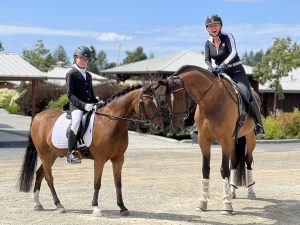March 2024
Blog #5 – Impactful Interactions in Sport and Life
Sandra Verda Zanatta
University of British Columbia
The impact of interaction in sport extends beyond the physical aspects of competition, encompassing relationships between athletes, coaches, fellow competitors and the unique horse and rider relationship. Its value and contribution to the emotional, psychological and social growth of athletes needs to be recognized and fostered. Coaches have the opportunity to create cohesive environments of trust, camaraderie and sportsmanship through impactful, respectful interactions; which in turn, facilitate mentorship, guidance and support in both sport and life. In my experience, athletes who have mutual respect for fellow competitors, and exhibit sportsmanship, are able to elevate their performance, maintain a positive mindset, and have meaningful competition experiences even when results or outcomes are not optimal.
Learning to facilitate positive, productive interactions requires an increased level of self-awareness, regulation and emotional control. I recognize through my own career and observations as a coach developer, that young coaches need more guidance, earlier, to cultivate leadership abilities, conflict resolution strategies and communication adeptness. As a mentor, I encourage the development of these skills through educational opportunities and modelling. If I can impart some of my experiences and encourage open, honest, face to face communication, it will help not only with the future challenges they may encounter in sport, but also in other aspects of their lives.
The ability to communicate effectively and respectfully even in difficult, high intensity situations is gained through experience, time and maturity; it requires thorough, honest self-reflection. My coaching context requires me to constantly interact with a diverse population of athletes and parents, competition officials and boards of directors, sponsors and horse owners, lawyers and business professionals. At times, difficult discussions are warranted, and when significant financial investments are made expectations to perform and win can be high. As a result, riders often impose extra pressure on themselves to meet these expectations. There is a delicate balance that needs to be maintained to shield athletes and facilitate continuity of training, allowing them to remain focused on, while also respecting and appreciating the opportunities that sponsors and horse owners provide. Often, my job is to navigate both sides so we can produce optimal performance and maintain healthy, appropriate relationships.
Discussions with parents and athletes around competition readiness, or not, explaining the reasons for a poor performance, or informing coach candidates the reasons they have not met the requirements for certification, can spark tension, fuel emotions and be disappointing. Although it is crucial to approach these conversations with empathy and kindness, honesty and clarity are also equally important. Having a clear objective that promotes effective communication with a focus on the work or goal without personal references is important to a obtaining a productive outcome. Being specific and clear about the areas needed for improvement, the requirements to move forward, and establishing a plan is a positive way to bring recognition to the issues or weaknesses and ultimately supports future success through a systematic approach for further training.
Equestrian sport requires another level self-awareness that directly relates to how we interact with our equine partners. Horses are complex, sensitive beings and highly perceptive to body language and external stimuli. Human movements and intentions can affect horses’ reactions significantly whether riding, handling or ground training. We have the ability to affect their tension levels and response to stimuli based on how we react and the level of energy we exude. Rider emotional control and self-regulation are key performance factors both in training and competition. Horses are social, herd animals who respond to fellow horses’ energy and excitement. The ability for a rider to maintain composure, stay focused and interact with their horse in a way that promotes confidence, trust and relaxation is crucial, making it an important component of daily training.
As I reflect on my career, I am grateful for the path coaching has taken me on, for the lifelong friends and colleagues I have gained and the amazing athletes I have had the honour to work with. I am proud of my riders, their sport accomplishments representing Canada, and medals won, but ultimately the most important aspect has been my opportunity to create safe, supportive environments, enabling riders of all levels to grow, be challenged, develop confidence, and recognize their self-worth and that of others. It has been rewarding to watch them succeed as athletes and become kind, responsible young adults with a high standard of integrity and respect for others, who love horses and advocate for their welfare. I am honoured to have been a small part of their journey to who they are today.
Maya Angelou’s quote “I’ve learned that people will forget what you said, people will forget what you did, but people will never forget how you made them feel.” resonates with me and I will continue with the goal of approaching all interactions both personal and professional with clarity, honesty and respect.
